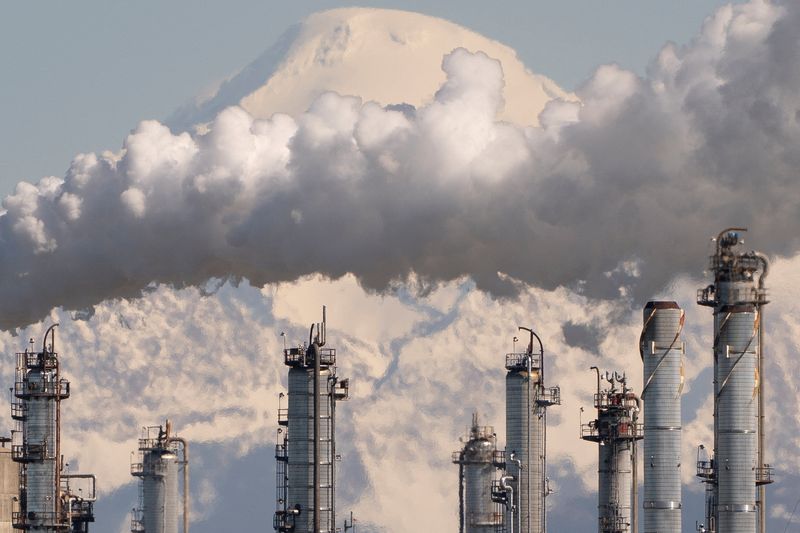Washington state vote a harbinger for wider carbon markets
By Timothy Gardner
(Reuters) - A ballot initiative to ax Washington state's carbon market would, if passed next week, send an ominous signal to other U.S. states and Canadian regions looking to build markets aimed at cutting emissions that scientists blame for climate change.
The carbon market, formed by the state's Climate Commitment Act (CCA), has raised more than $2 billion for programs including transit, wildfire protection, and salmon protection since its 2023 launch.
It is supported by Native American tribes and environmental groups, as well as BP (NYSE:BP ), a global energy company preparing for the potential wider adoption of such markets.
Hedge fund manager Brian Heywood is leading the initiative in the Nov. 5 elections to repeal it. He blames CCA, which puts emissions limits on about 100 of the state's largest polluters, for spiking Washington's gasoline prices to the highest in the U.S. in mid-2023.
Heywood, the millionaire Republican and CEO of Taiyo Pacific Partners, holds rallies for the initiative at gas stations, where he gives drivers money to reduce the cost of fill-ups.
"The guys that have to drive 45 minutes a day in their 2002 Honda (NYSE:HMC ) sedans, they're the ones that get crushed, and no one's standing up for them, so I am," Heywood told Reuters.
Backers of cap-and-trade carbon markets say they can efficiently tackle carbon emissions by harnessing the power of capitalism.
In such markets, the government sets gradually falling limits on carbon pollution. Industry can meet the limits by reducing their emissions through investments in clean energy. If they reduce emissions they can sell allowances to other emitters who choose not to make the efficiency investments.
Washington's market may eventually link to similar mechanisms in California and Quebec, which backers say would give industries a broader choice of credits.
Luke Sherman, a carbon markets analyst at the consultancy Energy Aspects, said which way Washington votes could influence decisions in states like New York, which has proposed a carbon market to meet its 2050 carbon emissions goals, and in New Jersey and Maryland where some lawmakers support carbon markets.
It could also help persuade California and northeastern states in the Regional Greenhouse Gas Initiative to either broaden existing carbon markets to more industries or narrow them.
"How ambitious they want to be could certainly be influenced by their perception of voter support or rejection of carbon pricing in Washington," Sherman said.
'NEEDS SOME FIXES'
Washington state auctions of the allowances also earn revenues that it invests in projects from clean transit to salmon fisheries.
Kelsey Nyland, a spokesperson for No On 2117, named after the ballot number, said if the measure passes it would cut billions of dollars in funding hurting "every corner of our state, putting major road and bridge projects addressing congestion, safety and freight mobility at risk of being delayed or even canceled."
Community Transit, which serves Puget Sound, said it would lose about $200 million through 2038. Programs that could be hit include bus rapid transit, an efficient service featuring dedicated lanes.
"The last thing we'd like to cut is service to our customers, but that certainly could happen," said spokesperson Martin Munguia.
A poll conducted in October sponsored by The Seattle Times and others showed 48% of respondents oppose the initiative, 30% said "yes" and 22% were undecided.
Big fossil fuel companies could help overcome the measure.
BP is working to defeat the initiative "because it moves the state backwards on climate action and endangers funding for key transportation infrastructure and other low-carbon projects," a spokesperson said.
BP owns Cherry Point, the largest oil refinery in the Pacific Northwest. When asked whether it might oppose the measure because it would make any pollution allowances it owns worthless, BP referred to Washington state rules forbidding the disclosure of details on market positions.
Energy Aspects' Sherman said if the measure succeeds, energy companies may have to face new state emissions regulations blunter in nature than carbon pricing.
"These regulations could be costlier for some emitters than their obligations under the cap-and-invest program," Sherman said.
The Western States Petroleum Association has not opposed CCA, but wants changes to avoid fuel price spikes.
"Regardless of the election results, the program needs some fixes for it to be affordable for consumers and sustainable for the long run," said Jessica Spiegel, vice president, northwest region of WPSA.
Source: Investing.com
